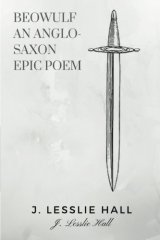Beowulf Page #9
Beowulf is an Old English epic poem consisting of 3,182 alliterative lines. It is one of the most important works of Old English literature. The date of composition is a matter of contention among scholars; the only certain dating pertains to the manuscript, which was produced between 975 and 1025.
70 I ween he will wish, if he win in the struggle, To eat in the war-hall earls of the Geat-folk, Boldly to swallow[4] them, as of yore he did often The best of the Hrethmen! Thou needest not trouble A head-watch to give me;[5] he will have me dripping [17] {In case of my defeat, thou wilt not have the trouble of burying me.} 75 And dreary with gore, if death overtake me,[6] Will bear me off bleeding, biting and mouthing me, The hermit will eat me, heedless of pity, Marking the moor-fens; no more wilt thou need then {Should I fall, send my armor to my lord, King Higelac.} Find me my food.[7] If I fall in the battle, 80 Send to Higelac the armor that serveth To shield my bosom, the best of equipments, Richest of ring-mails; 'tis the relic of Hrethla, {Weird is supreme} The work of Wayland. Goes Weird as she must go!" [1] Some render 'gif-sceattas' by 'tribute.'--'Géata' B. and Th. emended to 'Géatum.' If this be accepted, change 'of the Geatmen' to 'to the Geatmen.' [2] If t.B.'s emendation of vv. 386, 387 be accepted, the two lines, 'Hasten ... kinsmen' will read: Hasten thou, bid the throng of kinsmen go into the hall together. [3] For 420 (b) and 421 (a), B. suggests: Þær ic (on) fífelgeban ýðde eotena cyn = where I in the ocean destroyed the eoten-race.--t.B. accepts B.'s "brilliant" 'fífelgeban,' omits 'on,' emends 'cyn' to 'hám,' arranging: Þær ic fífelgeban ýðde, eotena hám = where I desolated the ocean, the home of the eotens.--This would be better but for changing 'cyn' to 'hám.'--I suggest: Þær ic fífelgeband (cf. nhd. Bande) ýðde, eotena cyn = where I conquered the monster band, the race of the eotens. This makes no change except to read 'fífel' for 'fífe.' [4] 'Unforhte' (444) is much disputed.--H.-So. wavers between adj. and adv. Gr. and B. take it as an adv. modifying etan: Will eat the Geats fearlessly.--Kl. considers this reading absurd, and proposes 'anforhte' = timid.--Understanding 'unforhte' as an adj. has this advantage, viz. that it gives a parallel to 'Geátena leóde': but to take it as an adv. is more natural. Furthermore, to call the Geats 'brave' might, at this point, seem like an implied thrust at the Danes, so long helpless; while to call his own men 'timid' would be befouling his own nest. [5] For 'head-watch,' cf. H.-So. notes and cf. v. 2910.--Th. translates: Thou wilt not need my head to hide (i.e., thou wilt have no occasion to bury me, as Grendel will devour me whole).--Simrock imagines a kind of dead-watch.--Dr. H. Wood suggests: Thou wilt not have to bury so much as my head (for Grendel will be a thorough undertaker),--grim humor. [6] S. proposes a colon after 'nimeð' (l. 447). This would make no essential change in the translation. [7] Owing to the vagueness of 'feorme' (451), this passage is variously translated. In our translation, H.-So.'s glossary has been quite closely followed. This agrees substantially with B.'s translation (P. and B. XII. 87). R. translates: Thou needst not take care longer as to the consumption of my dead body. 'Líc' is also a crux here, as it may mean living body or dead body. VIII. HROTHGAR AND BEOWULF.--Continued. {Hrothgar responds.} Hrothgar discoursed, helm of the Scyldings: "To defend our folk and to furnish assistance,[1] Thou soughtest us hither, good friend Beowulf. {Reminiscences of Beowulf's father, Ecgtheow.} The fiercest of feuds thy father engaged in, 5 Heatholaf killed he in hand-to-hand conflict 'Mid Wilfingish warriors; then the Wederish people For fear of a feud were forced to disown him. Thence flying he fled to the folk of the South-Danes, [18] The race of the Scyldings, o'er the roll of the waters; 10 I had lately begun then to govern the Danemen, The hoard-seat of heroes held in my youth, Rich in its jewels: dead was Heregar, My kinsman and elder had earth-joys forsaken, Healfdene his bairn. He was better than I am! 15 That feud thereafter for a fee I compounded; O'er the weltering waters to the Wilfings I sent Ornaments old; oaths did he swear me. {Hrothgar recounts to Beowulf the horrors of Grendel's persecutions.} It pains me in spirit to any to tell it, What grief in Heorot Grendel hath caused me, 20 What horror unlooked-for, by hatred unceasing. Waned is my war-band, wasted my hall-troop; Weird hath offcast them to the clutches of Grendel. God can easily hinder the scather From deeds so direful. Oft drunken with beer {My thanes have made many boasts, but have not executed them.} 25 O'er the ale-vessel promised warriors in armor They would willingly wait on the wassailing-benches A grapple with Grendel, with grimmest of edges. Then this mead-hall at morning with murder was reeking, The building was bloody at breaking of daylight, 30 The bench-deals all flooded, dripping and bloodied, The folk-hall was gory: I had fewer retainers, Dear-beloved warriors, whom death had laid hold of. {Sit down to the feast, and give us comfort.} Sit at the feast now, thy intents unto heroes,[2] Thy victor-fame show, as thy spirit doth urge thee!" {A bench is made ready for Beowulf and his party.} 35 For the men of the Geats then together assembled, In the beer-hall blithesome a bench was made ready; There warlike in spirit they went to be seated, Proud and exultant. A liegeman did service, [19] Who a beaker embellished bore with decorum, {The gleeman sings} 40 And gleaming-drink poured. The gleeman sang whilom {The heroes all rejoice together.} Hearty in Heorot; there was heroes' rejoicing, A numerous war-band of Weders and Danemen. [1] B. and S. reject the reading given in H.-So., and suggested by Grtvg. B. suggests for 457-458: wáere-ryhtum Þú, wine mín Béowulf, and for ár-stafum úsic sóhtest. This means: From the obligations of clientage, my friend Beowulf, and for assistance thou hast sought us.--This gives coherence to Hrothgar's opening remarks in VIII., and also introduces a new motive for Beowulf's coming to Hrothgar's aid. [2] Sit now at the feast, and disclose thy purposes to the victorious heroes, as thy spirit urges.--Kl. reaches the above translation by erasing the comma after 'meoto' and reading 'sige-hrèðsecgum.'--There are other and bolder emendations and suggestions. Of these the boldest is to regard 'meoto' as a verb (imperative), and read 'on sæl': Think upon gayety, etc.--All the renderings are unsatisfactory, the one given in our translation involving a zeugma. IX. UNFERTH TAUNTS BEOWULF. {Unferth, a thane of Hrothgar, is jealous of Beowulf, and undertakes to twit him.} Unferth spoke up, Ecglaf his son, Who sat at the feet of the lord of the Scyldings, Opened the jousting (the journey[1] of Beowulf, Sea-farer doughty, gave sorrow to Unferth 5 And greatest chagrin, too, for granted he never That any man else on earth should attain to, Gain under heaven, more glory than he): {Did you take part in a swimming-match with Breca?} "Art thou that Beowulf with Breca did struggle, On the wide sea-currents at swimming contended, 10 Where to humor your pride the ocean ye tried,
Translation
Translate and read this book in other languages:
Select another language:
- - Select -
- 简体中文 (Chinese - Simplified)
- 繁體中文 (Chinese - Traditional)
- Español (Spanish)
- Esperanto (Esperanto)
- 日本語 (Japanese)
- Português (Portuguese)
- Deutsch (German)
- العربية (Arabic)
- Français (French)
- Русский (Russian)
- ಕನ್ನಡ (Kannada)
- 한국어 (Korean)
- עברית (Hebrew)
- Gaeilge (Irish)
- Українська (Ukrainian)
- اردو (Urdu)
- Magyar (Hungarian)
- मानक हिन्दी (Hindi)
- Indonesia (Indonesian)
- Italiano (Italian)
- தமிழ் (Tamil)
- Türkçe (Turkish)
- తెలుగు (Telugu)
- ภาษาไทย (Thai)
- Tiếng Việt (Vietnamese)
- Čeština (Czech)
- Polski (Polish)
- Bahasa Indonesia (Indonesian)
- Românește (Romanian)
- Nederlands (Dutch)
- Ελληνικά (Greek)
- Latinum (Latin)
- Svenska (Swedish)
- Dansk (Danish)
- Suomi (Finnish)
- فارسی (Persian)
- ייִדיש (Yiddish)
- հայերեն (Armenian)
- Norsk (Norwegian)
- English (English)
Citation
Use the citation below to add this book to your bibliography:
Style:MLAChicagoAPA
"Beowulf Books." Literature.com. STANDS4 LLC, 2025. Web. 10 Mar. 2025. <https://www.literature.com/book/beowulf_945>.








Discuss this Beowulf book with the community:
Report Comment
We're doing our best to make sure our content is useful, accurate and safe.
If by any chance you spot an inappropriate comment while navigating through our website please use this form to let us know, and we'll take care of it shortly.
Attachment
You need to be logged in to favorite.
Log In